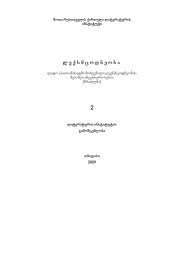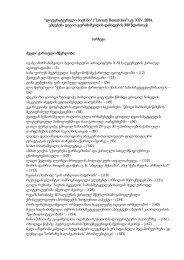Shota Rustaveli Institute of Georgian Literature
Shota Rustaveli Institute of Georgian Literature
Shota Rustaveli Institute of Georgian Literature
You also want an ePaper? Increase the reach of your titles
YUMPU automatically turns print PDFs into web optimized ePapers that Google loves.
avoidance. Thus, the 2nd example -Where can I powder my nose? implies “where is the toilet?. The psychological<br />
euphemisms, such as restroom, part with the baby, harvest wildlife; in Bulgarian: водни пъдпъдъци (literally: “water<br />
grouse,” i.e. frogs as food), бели бъбреци (“white kidneys” – i.e. testicles), have to do with avoiding unpleasant or<br />
indecent subjects, or are used for the sake <strong>of</strong> what is perceived as politeness. Furthermore, some euphemisms give an<br />
insight into the nature and practice <strong>of</strong> different political systems, as well as people’s mentality and cultural<br />
characteristics. Consequently, when President Bush says there will be serious consequences it means “war”; when<br />
Donald Rumsfeld mentions a little untidiness, its meaning is transparent: “loot and plunder.”<br />
This type <strong>of</strong> mind control by means <strong>of</strong> lexical mis/use has always been a social fact: cf. the final solution for<br />
“annihilation <strong>of</strong> the Jews by the Nazis,” collateral damage for “civilian casualties,” friendly fire for “bombs or bullets<br />
which accidentally kill people on the side which has fired the weapons” (LDELC); wildlife management, harvesting,<br />
depopulation for “large-scale killing <strong>of</strong> animals or trees.” (Pei, 1973) Cf. also some other examples culled from CNN:<br />
“efforts are under way to get the population to settle down” (stop looting), “a major disaster” (murder, death), “respect<br />
ceasefire” (do not shoot).<br />
As Noam Chomsky noted in a BBC interview about his famous book Rogue States: When the Americans say<br />
“we are doing it to protect NATO’s credibility,” any don will tell you it means “do as we say, or else.” For this very<br />
reason the UN language is an interesting study in euphemisms: unlawful use <strong>of</strong> force against … or illegal war in…<br />
means “aggression”; when K<strong>of</strong>i Annan would say: “I have qualms about this decision,” what he really meant was that<br />
he was against it.<br />
In these cases, the avoidance language serves either to justify inaction – if it is aggression or slaughter <strong>of</strong> the<br />
civilians, the international organizations should put their foot down and act; 1 or as a means to brainwash the public, to<br />
hide the meaning <strong>of</strong> what is happening, to neutralize the importance <strong>of</strong> an event by verbal means. Not coming to the<br />
point is part <strong>of</strong> the political culture in many countries. The desire to justify and control accounts for the following<br />
statement made by Lidia Shouleva, the one-time Bulgarian Minister <strong>of</strong> Economy, who was proud to point out in a TV<br />
interview (purportedly as a sign <strong>of</strong> progress): “Вече не говорим за намаляване на безработицата, а за увеличаване<br />
на заетостта“: (We no longer talk about decreasing unemployment but about increasing employment.) 2<br />
Indeed, language or even silence as a means <strong>of</strong> control, may be traced back to totalitarianism: e.g. in the culture<br />
<strong>of</strong> secrecy <strong>of</strong> totalitarian Bulgaria, demography was taboo (no statistics could be divulged about the population breakdown<br />
into ethnic groups, the altitude <strong>of</strong> unmapped mountain tourist shelters, the depth <strong>of</strong> the Black Sea in certain<br />
areas, etc.), while in the Soviet Union there was no sex or diseases. The Russian writer Sergei Dovlatov describes an<br />
interview given to a group <strong>of</strong> American congressmen by the then Party Secretary <strong>of</strong> Leningrad. When the party <strong>of</strong>ficial<br />
was asked about the mortality rate in Leningrad the answer was that in Leningrad there was no mortality rate. This<br />
situation still rings some bells. In the 2003 film Spinning Boris directed by Roger Spottiswoode, which features Boris<br />
Yeltsin’s re-election campaign conducted using American expertise, the American consultant played by Jeff Goldblum<br />
says, -“Don’t say Yeltsin is having the flu, because in Russia everybody would think he is on his deathbed!”<br />
The use <strong>of</strong> another group <strong>of</strong> euphemisms is due to advertising and marketing reasons. Thus, in Bulgarian<br />
supermarkets there are no small eggs any more - only medium, large or extra-large, while in the USA they are<br />
described as medium, large, extra-large and jumbo. The euphemisms which you have “to see through” (like medium<br />
eggs with the meaning <strong>of</strong> “small”) cater for the market situation and aim to attract more customers. Another<br />
manifestation <strong>of</strong> avoidance is in hyper-inflation <strong>of</strong> English. According to Neil Tweedie, to make an impact now you<br />
have to be a superhero, vegetables must be dew-fresh, market-fresh or seasonal. ”Uptitling” is an <strong>of</strong>fence in which<br />
employees are given elevated titles to keep them happy. Thus managers become executive managers, associate<br />
managers or managers at large (see also vice president <strong>of</strong> a company – IP) Post room workers are now dispatch<br />
services facilitators. “As part <strong>of</strong> the ‘bigging-up’ or ‘supersizing’ trend the prefixes “ova, uber or mega prefixes are<br />
used to beef up words.”<br />
(Tweedie, 2005)<br />
In all the above examples, the most common reasons for implicating, instead <strong>of</strong> saying directly or overtly, is<br />
avoidance <strong>of</strong> what is regarded as taboo or unpleasant, as socially unacceptable or impolite or for manipulative<br />
purposes – to play down or to play up the importance <strong>of</strong> the event or object. What is being referred to is being<br />
implicated, not explicitly stated, and can only be interpreted correctly given the existence <strong>of</strong> shared codes which may<br />
range from a dialogue between two interlocutors to a cultural community at large. I would also like to postulate that<br />
the degree <strong>of</strong> indirectness differs in different cultures, amongst other things depending on the cultural dimension <strong>of</strong><br />
high and low context propounded by E.T.Hall (Hall, 1981). In fact, different communication styles <strong>of</strong> British English<br />
and American English have been noted by researchers: thus, Dunkerley and Robinson point out that the British<br />
communication style is characterized by the opaqueness <strong>of</strong> the relationship between semantics and pragmatics. “To<br />
interpret successfully requires an understanding <strong>of</strong> the particular Gricean implicatures <strong>of</strong> particular comments in which<br />
the overt context may bear a variety <strong>of</strong> relationships to the intended meaning. For example, to expect an outsider to<br />
interpret “not bad at all” as meaning “very good indeed” is to expect too much …just as the interpretation <strong>of</strong> “It might<br />
be an idea, if you were to do x” as an urgent imperative requires long acculturation to decode” (Dunkerley et al, 2002).<br />
1 Cf. “calling a spade a spade would have mattered, because if it was genocide, how could you not act, however difficult it was?” Barnaby<br />
Mason, “The Language <strong>of</strong> Diplomacy” From Our Own Correspondents:May 2004,<br />
http://newsvote.bbc.co.uk/mpapps/pagetools.print/news.bbc.co.uk/1/hi/programmes/<br />
2 There are numerous interesting examples as well as the rationale <strong>of</strong> “language demagogy” in Стефана Димитрова, 1999, pp.29-31.<br />
117

















